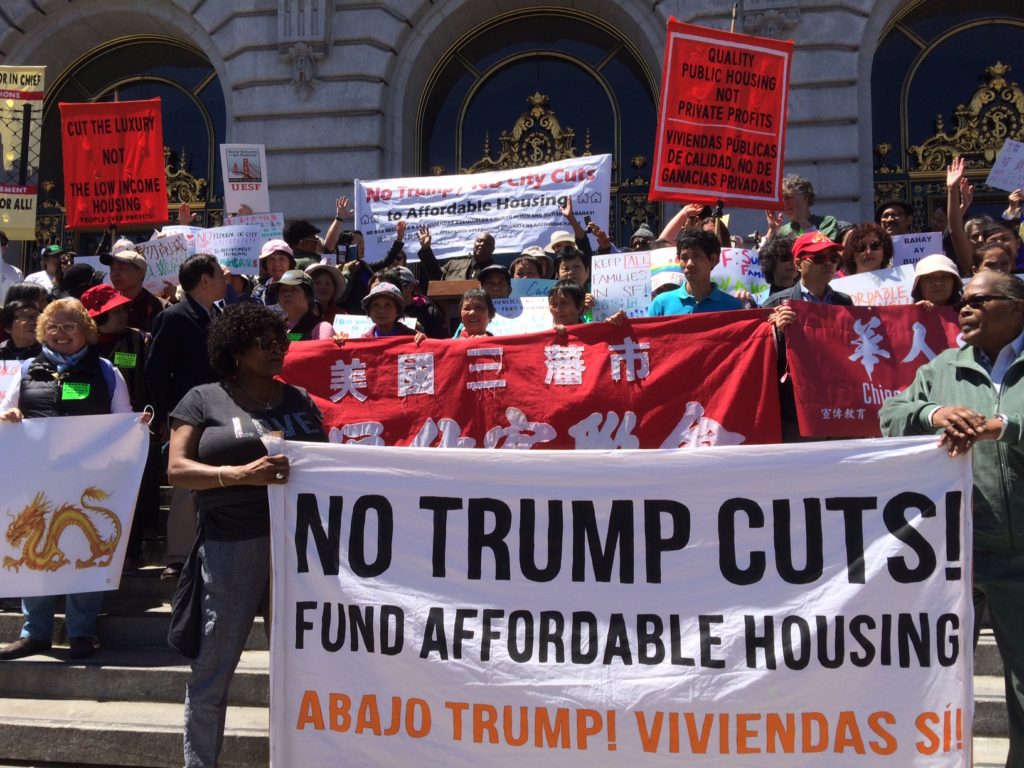Across the nation, homeless and housing advocates are fighting against the $6.8 billion Department of Housing and Urban Development (HUD) budget cuts proposed by the Trump administration. The Department is led by former neurosurgeon Ben Carson, who has said that compassion is means not providing “a comfortable setting that would make somebody want to say: ‘I’ll just stay here. They will take care of me” and that poverty is a “state of mind.”
Since the proposed cuts, which represent a 14 percent reduction to a $40.7 billion budget, organizations and communities have been resisting by organizing rallies and protests decrying the tremendous decreases in funding. From San Francisco to New York to Chicago, thousands have taken to the streets.
The Community Development Block Grant faces the largest cut of $4.1 billion. Used for a variety of community projects ranging from streetscape projects to meal programs, the program would be completely eliminated with the proposed budget. The HOME Investment Partnerships Program, used to fund many affordable housing activities such as homeownership and rental housing development, would also be completed eliminated.
The Public Housing Operating Fund, which would lose $500 million, currently is used to help subsidize the rent of 1.2 million families. Amongst those who would be hardest hit are the elderly, people with disabilities, and families.
Megan Hustings, director of the National Coalition for the Homeless, says, “If the president’s budget goes through, this is a disaster for our community. Even more people will lose their housing, and there will be stricter rules for people who are in affordable housing. Affordable housing and programs are not being prioritized. No cuts to HUD is a good cut, and we are in a severe housing crisis. We simply cannot afford any cuts to any programs. We need more investment, if anything. It’s similar to the cuts made during the Reagan administration, which we believe caused a great increase in homelessness in the 70s. The cuts will increase homelessness and poverty in America.”
The cuts, which would take effect in 2018, are already being felt in some cities. Some housing authorities have begun tightening their programs, particularly senior housing programs, in preparation for cuts by limiting the number of people on a waiting list or eliminating the list altogether.
In the past, housing authorities have used varied tactics, including wait list and eligibility limitations, to reduce program numbers. Under the “One Strike, You’re Out” policy enacted in 1996, federal public housing tenants would be evicted if they—or even their guest—engaged in criminal activity on, and sometimes off, the premises.
The cuts would represent the greatest loss in funding since the Reagan administration, when HUD was devastatingly reduced by nearly 70 percent. Still, housing advocates reiterate that HUD budget cuts are nothing new—and that HUD has never been restored to its original budget since the eighties.
According to a statement by the Western Regional Advocacy Project, a coalition of west coast homeless organizations, “We are looking at a 38-year-cycle of draconian cuts to our nation’s affordable housing programs and the direct correlation of how this creates and perpetuates homelessness.”
On some estimates, San Francisco stands to lose over $114 million annually in federal funds, which could impact 6, 535 households each year—which could triple the number of homeless San Franciscans.
According to Hustings, the budget will most likely be delivered by the end of July.
Jennifer Friedenbach, director of the Coalition on Homelessness, asks, “Look around the streets of the major US cities and you can see for yourself the effects of our last HUD cuts. Can we really afford to do this again?”


